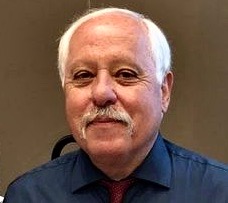You meet someone along your path in life, an instructor, a mentor or a colleague who -- despite a relatively brief professional association -- becomes an influence that lasts a lifetime.
That was certainly the case with me and Dr. Edward Francis Wilson III, who passed away at age 82 on August 28.
We first met in 1983. Ed was the clinical pathologist at McKenzie-Willamette Hospital and I was the newly hired editor of Pulse Beat, the hospital’s community newsletter. I was often referred to Dr. Ed, as I called him, as a source for feature articles on medical issues of interest to the public in the Eugene-Springfield area.
With a common love of mountain and river adventures, we immediately clicked. We had an affinity for the outdoors and a shared background in sports, travel and the arts. We both had a wild yen to visit Nepal and trek among the Himalayas. Only one of us was able to accomplish that feat, and it wasn’t me. Not yet, anyway.
Planning the editorial content for Pulse Beat one day, I had tackled a new disease that had dominated the news that year: Acquired Immune Deficiency Syndrome, now known by its acronym, AIDS. As a reporter seeking the best source for such a new and puzzling disease, turns out he was right under my nose: Dr. Ed.
As we began our interview, a lab technician poked her head in and asked: “Could you take a look at something quickly?” “Sure,” came his reply, as he excused himself. “On second thought, why don’t you join me?” “Me?” I asked, sheepishly. “Yes, I’d like you to take a look at something,” came the reply. "It will just take a minute."
Peering over a stainless-steel sink, I saw what appeared to be an internal organ of some sort; it was pink and round, and about the size of a softball. “What’s that?” I inquired, momentarily displacing my fear of blood and gore with a suddenly steely reserve. “It’s a woman’s uterus,” he replied, matter-of-factly. “Here, take a look.”
Then, with the skill of a Soji chef, he cut the swollen organ into fine slices. “Can you see the cancerous tumors?” Sure enough: black specks hidden within the otherwise pink organ. “It had to be removed for her own welfare." Such is the life of a clinical pathologist. Thanks to Dr. Ed, my tendency for squeamishness was forever gone.
After I left the hospital for EWEB, Dr. Ed would eventually become the Lane County Medical Examiner, an even more intense job. I’d occasionally bump into him walking for exercise at Valley River Center or the Amazon Trail, attending a concert at the Hult Center, or cheering the Duck basketball team on campus.
Despite his busy schedule, he always had time for me. Before an interview, we would swap tales of mountains climbed and rivers rafted. He knew the value of communication as a way for patients to understand the world of medicine. Kind, humble and always inquisitive, he was a much beloved medicine man.



No comments:
Post a Comment